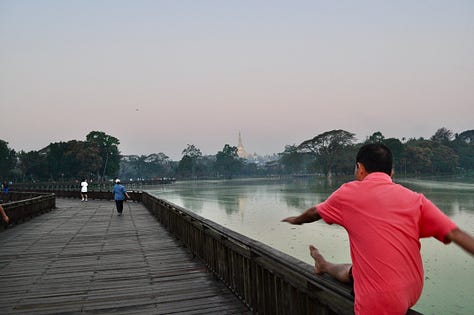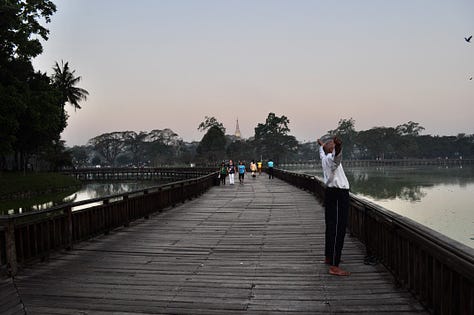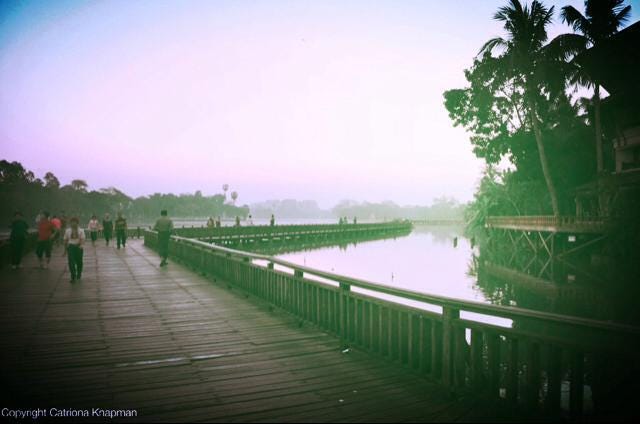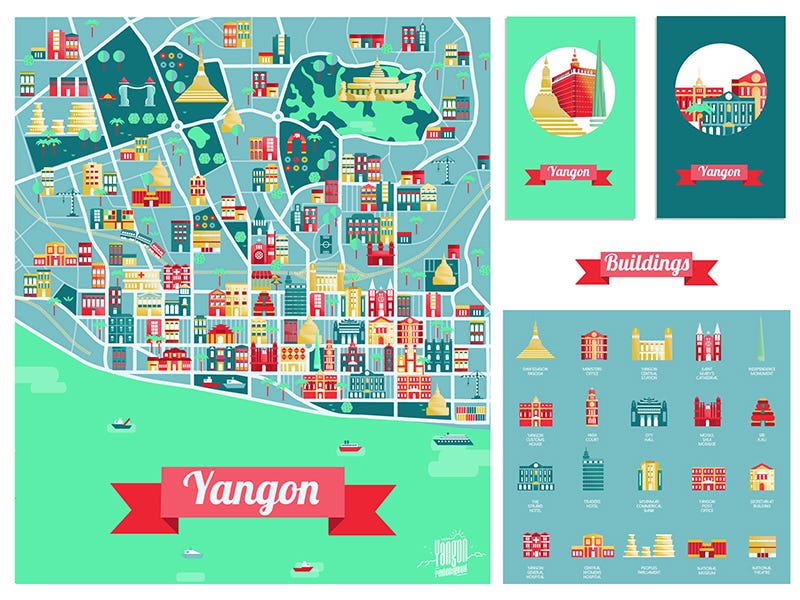During the winter season, Yangon would entice me to get up before six and go for a run. At six it was still dark and in January, it was novelly cold. The type of cold, when it feels good to wear a light sweater. The type of cold you get excited about if you live in tropical countries because it lasts for only a few short weeks of the year. For me, that chill was nostalgic of home. And wanting to feel the fresh air on my skin would compel me to get up early. I knew by next month - the early morning magic would be gone.
At six, I would step onto the cool floor of a still-dark flat, pull on sports clothes - including the novelty of a long-sleeved sweater - before I slipped into the darkened streets of Yangon. I would walk along the unlit roads - dodging the gaping holes in the pavement and the tree roots which stuck up through the concrete. I crossed to the other side to avoid the lurking street dogs, nodded at a few street sellers unloading crates of produce, often looked up to see the remainder of the moon in the sky or the shining light of Shwe Dagon Pagoda in the distance. I passed the zoo, hearing the faint sounds of animals shuffling behind the brick wall until I reached Kan Daw Gyi Lake - a park in the middle of the city.
The lake had an old boardwalk with uneven wooden boards, nails which stick out and planks that bounce when you run on them. Trees peered out of the early morning winter mist and the golden shape of a dragon - a floating restaurant - stood hazy in the distance. It often seemed an Asian cliché. Exactly like an image from the box of the sort of souvenir you could buy at an airport. Golden pagodas, dragons, mist and still glass-like waters.
By midday Kan Daw Gyi became a site dominated by young couples hiding under umbrellas but in the morning it took a quiet shape. Trees blocked out the sounds of passing traffic. Black crows called out as they woke from their nighttime perches and swept down to grab food from the pavement, or circled towards the pagoda in the distance.
I was never alone at the lake. It was always softly busy. The majority of people powerwalked on the boardwalk in twos or threes. Some men were dressed seriously, in old shorts and flat-soled trainers, carrying transistor radios on their shoulders, which blasted the news or music. Others ran in flip-flops which made hard staccato sounds when they hit the wood. Many people turned the wooden frames of the boardwalk into gyms - which they used to stretch their limbs. One man stood alone doing Tai Chi at the lake’s edge, his movements melting like butter.
The exercise around the lake felt calming - because it was simple - not competitive. I especially enjoyed the classes which took place at 6.30 am near the park entrance - a mixture of Tai Chi and aerobics - performed to Chinese music lilting over the water. Women would follow an instructor as he moved through a range of exercises, from the graceful flow of Tai Chi, where they would reach and retreat with elegance; transitioning into the more militaristic: running on the spot, lifting their hands in the air. Then to the fun, shaking their wrists, twisting their hips. It reminded me of PE at school. The type of exercises which we don’t seem to do as we get older as they look a bit silly. There is no gain attached. They don’t allow us to say we run five kilometres or mastered a downward dog. They are just about moving.
The class always had a range of students - some women in sweatbands and exercise clothes with serious faces as well as shyer participants - girls in thin, tightly wrapped longyis and flip flops - hiding in the back and collapsing frequently in giggles.



One morning, I decided to shyly join in, aware I looked very foreign, but wanting to be a part of it. I took a spot at the side of the group, near the giggling girls and followed an older woman in the centre who knew the moves. A young girl beside me shakes her hands like she is dancing in a club and the usually angular movements of the Burmese become curved and rounded, shaking in full Latin Style.
As the class progressed, the New World Symphony started to play on the old tape recorder accompanied by a woman singing in - what I think was Chinese -. ‘Bur ... See... Bur... See’, she went. We bent our knees, moved our arms wide and clapped our hands. Then we raised our hands high into a V-shape, bounced up and down, shouting as loud as we could: “Hey, Hey, Hey!”
Then the class was over. I smiled awkwardly at my fellow exercisers before I walked slowly back to the park gate. As I crossed the water one man stretched his arms out wide, breathed in, then let out one long scream over the lake.
The birds fluttered, the trees fluttered, the morning fluttered. The sun - a red, winter sun - still rising out of the earth takes on this challenge.
From the other side of the lake, a group of people scream in one long reply.
That is one way to start the day.
A moment to mention the conflict in Myanmar
In sharing this piece, I want to take a moment to highlight the under-reported conflict in Myanmar and draw attention to the many Myanmar citizens taking daily risks for their political freedom.
Studies show Myanmar to be the country facing the highest level of conflict worldwide (and the second deadliest - after Ukraine).
Since the coup d’etat in 2021, over 50,000 people have lost their lives and over 20,000 people have been imprisoned for their political beliefs.
This also has wider impacts on the economic situation in the country.
I also think it is important to bear in mind, the impact that British colonial occupation had on Myanmar and the way that history plays out in Myanmar today. Or in other words - it might be happening over there - but the suffering, in what can seem a very distant country, is linked in many ways to our lives and our history.
That is not to cast blame, but to remember, that we live in a connected but also unequal world, due to these past legacies.
Some Myanmar resources
If you want to find out more about what is happening in the country:
This is a good top-level summary.
You could follow these Instagram updates on an account which was started around the time of the coup d’etat and still posts regularly: Listen Up.
You could read these independent news sites from Myanmar: The Irrawaddy and Myanmar Now
For example, this piece on the role of global capitalism in creating the current political crisis.
There are also a lot of good books which help to understand the country, its rich ethnic cultures, religious stories, as well as its unique history. I will share those recommendations another day.
I would love to know: What are the most inspiring ways you have started your day?
Have a great week and see you all next Sunday.





Beautiful read!✨ My favorite mornings include scribbling words on pages before I’m too awake to censor my self with a critical brain, some simple yoga poses & a magical walk in the woods by my home to a favorite Oak tree.